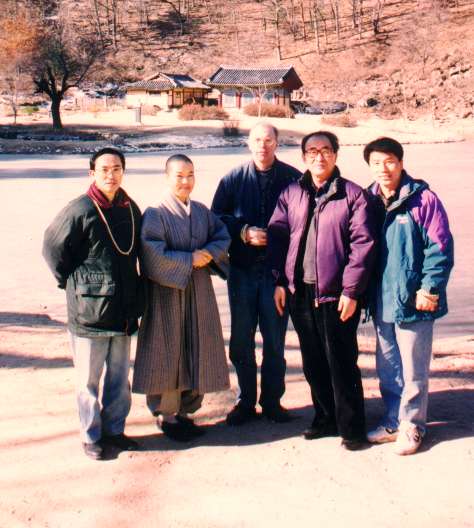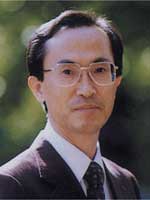김
영무
Young-Moo Kim (1944 - 2001)
 At Pulyon-sa, February 1997
At Pulyon-sa, February 1997
(Click here for an English-only
version)
Young-Moo Kim was
born in 1944 in Paju, near Seoul. After earning his B.A. and M.A. from the
English Department of Seoul National University, he received his Ph.D. from
the English Department of SUNY at Stony Brook with a dissertation on George
Eliot. He became a Professor in the Department of English Language and
Literature at Seoul National University in 1981.
His first published
article on Korean poetry, 이육사론
(창작과
비평,
1975년
여름호)
signified his recognition as a literary critic. He published a number of
translations from English: 침묵 속에 떠오르는 소리 (1977),블레이크 시선집
(1987, a volume of translations of poems by William Blake), 예수,
그
낯선분
(1989), 술례자
한느님
(1991, by Brother John of Taize) and more.
He published a
volume of personal essays 제비꽃에
너를
보며
(1988) and a volume of literary criticism 시의 언어와 삶의 언어
(1990), which received the prize for criticism in the 1991 Republic of Korea
Literary Awards.
He and Brother Anthony together
translated The Sound of my Waves and Beyond Self by Ko Un, Back
to Heaven by Ch'on Sang-Pyong, Faint Shadows of Love by Kim
Kwang-kyu, and Farmers’ Dance by Shin Kyong-Nim. Their volume of Kim
Kwang-Kyu won the Translation Prize in the 1991 Republic of Korea Literary
Awards, and the Ch'on Sang-Pyong volume was awarded the 1996 Korean PEN
Translation Prize.
In 1991, during a
2-year stay as visiting professor in Toronto (Canda), he began to publish poems
in a local Korean-language newspaper. In 1992, he and five others published in
Toronto a collection of their poems: 얼음비 온 다음 날. He first published
poems in Korea in 1993 and his first volume, 색동 단풍숲을 노래하라,
was published in May 1993. A second volume, 산은 새소리마저 쌓아 두지 않는구나,
was published while he was still in hospital recovering from an operation for
lung cancer in August 1998. He and his family spent a year in Perth, Australia
in 1999-2000 and his third volume, 가상현실, including poems
inspired by his experience of sickness and others about Australia, was
published in April 2001. It earned him the 3rd Paeksok Literary
Award, which his widow received in his place, four days after his death.
In the acceptance
speech he prepared for the Paeksok award ceremony, he described how he had
begun to find poems arising in him after seeing, in the church of a monastery
outside Toronto, a crucifix on which was hung an image, not of the human body
of Jesus but of the green globe of the natural creation, crowned with thorns
and bleeding. This image, combining his own ecological concerns and his
Catholic faith, deeply impressed him and the sight of it served as a moment of
epiphany.
From early in 2001,
he was bedridden, unable to walk thanks to the spreading cancer. With his
wife’s devoted care, he was able to remain at home, writing, translating, and
meeting friends, until the pain became too intolerable. He was taken to
hospital on Tuesday, November 20 and died at 7:30pm on Monday, November 26,
2001. Three days before he died, he wrote a final poem:
김영무
풀꽃으로 피어나
바람결에 놀다 갔다.
풀무치 새 울음소리 좋아하고
이웃 피붙이 같은 버들치
힘찬 지느러미 짓
더욱 좋아했다.
찬 이슬 색동보석 맺치는
풀섶세상
-- 참 다정도 하다.
2001.11.23평촌
In this land one
poet
blossomed -- a wild flower,
played in the
wind, then went away.
He enjoyed the
songs of crickets and birds,
enjoyed even more
the sturdy
fin-strokes
of minnows,
neighborly, kin-like.
The world of wild
greenery
where cool drops
of dew hang, many-hued jewels
-- it’s so full of
tenderness.
November 23, 2001
Here's a more official picture, but it makes him look too serious!

A Poet Dies Yet Lives: Young‑Moo Kim
(Prepared for the Korea Times)
On
Friday, November 30, many literary figures gathered high up in the Seoul Press
Center for the annual ceremony at which the Manhae Prize for Literature, the
Paeksok Prize and other literary awards are made, under the auspices of the
literary review Changjak gwa pipyong. This year the room was more
crowded than usual, and the atmosphere was perhaps slightly different becuase
almost everyone knew that the recipient of the Paeksok Prize, Kim Young-Moo,
had died only a few days before. Many of his friends and colleagues were glad
to have this more festive occasion to remember him after the gravity of his
funeral Mass two days before. For myself, grieving to have lost such a dear
friend and co-translator, it was an especially important moment of
commemoration and celebration.
Young‑Moo Kim was
born in 1944 in Paju, near Seoul. After earning his B.A. and M.A. from the
English Department of Seoul National University, he received his Ph.D. from
the English Department of SUNY at Stony Brook with a dissertation on George
Eliot. He became a Professor in the Department of English Language and
Literature at Seoul National University in 1981. He died on November 26, 2001.
His first article on
Korean poetry, dedicated to the poet Yi Yuksa, published in 1975, signified his
recognition as a literary critic. He published a number of translations from
English: including a volume of translations of poems by William Blake, and
several works on religious themes. He was a devout Catholic.
He published a
volume of personal essays in 1988 and a volume of literary criticism on “The
Language of Poetry and the Language of Life” in 1990, which
received the prize for criticism in the 1991 Republic of Korea Literary Awards.
He
and I together translated The Sound of my Waves and Beyond Self by
Ko Un, Back to Heaven by Ch'on Sang‑Pyong, Faint Shadows of Love
by Kim Kwang‑kyu, and Farmers’ Dance
by Shin Kyong‑Nim. There are still three more volumes of works by Ko Un waiting
to be published under our combined names. The volume of Kim Kwang‑Kyu won the
Translation Prize in the 1991 Republic of Korea Literary Awards, and the Ch'on
Sang‑Pyong volume was awarded the 1996 Korean PEN Translation Prize. He and I
were the judges in the Korea Times Translation Awards for several years.
In 1991, during a
2-year stay as visiting professor in Toronto (Canda), he began to publish poems
in a local Korean-language newspaper. In 1992, he and five others published in
Toronto a collection of their poems. He published a number of poems in Korea
early in 1993 and his first volume was published in May 1993. A second volume
was published while he was still in hospital recovering from an operation for
lung cancer in August 1998. He and his family spent a year in Perth, Australia
in 1999-2000 and his third volume, including poems inspired by his experience
of sickness and others about Australia, was published in April 2001. It earned
him the 3rd Paeksok Literary Award, which his widow received in his
place, four days after his death, on November 30.
In the acceptance
speech he had prepared for the Paeksok award ceremony, he described how he had
begun to find poems arising in him after seeing, in the church of a monastery
outside Toronto, a crucifix on which was hung an image, not of the human body
of Jesus but of the green globe of the natural creation, crowned with thorns
and bleeding. This image, combining his own ecological concerns and his
Catholic faith, deeply impressed him and the sight of it served as a moment of
epiphany.
From early in 2001,
he was bedridden by the spreading cancer. Thanks to his wife’s
devoted care, he was able to remain at home, writing, translating, and meeting
friends, until the pain became too intolerable. He was taken to hospital on
November 20 and died at 7:30pm on November 26, 2001. Three days before he died,
he wrote a final poem. It is too soon for me to write more about him. We who
knew and loved him are agreed that in this poem he gave us the very best
possible memorial.
Rainbow
Kim
Young-Moo
In this
land one poet
blossomed – a wild flower,
played in
the wind, then went away.
He enjoyed
the songs of crickets and birds,
enjoyed
even more
the sturdy
fin-strokes
of minnows,
neighborly, kin-like.
The world
of wild greenery
where cool
drops of dew hang, many-hued jewels
— it’s so full
of tenderness.
Written
in Pyongchon
November 23, 2001
Translated
by Brother Anthony